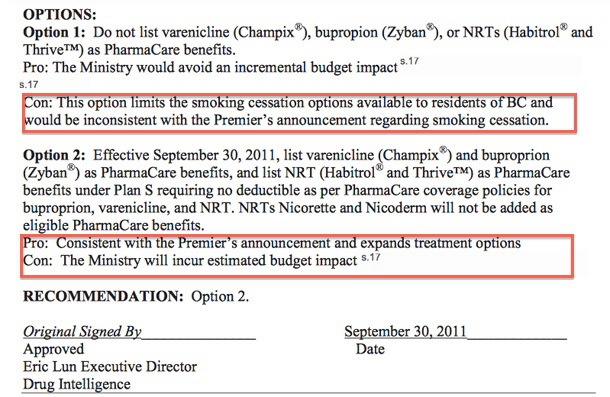
The main reason to publicly fund anti-smoking treatments was that Premier Christy Clark had already promised that the government would, according to a British Columbia government briefing note.
The note was prepared for a health ministry official so that he could make a decision on whether or not the province would pay for the full cost of anti-smoking treatments through the public PharmaCare drug plan.
"It's got the camouflage of a science-based decision, but clearly the recommendation is, 'Let's do this because the premier's already announced it,'" said health policy researcher and author Alan Cassels.
Cassels said that decisions to pay for drugs should be based on evidence, not politics, and noted that B.C.'s anti-smoking program has never had an independent evaluation.
In 2013, the B.C. government blocked the Therapeutics Initiative at the University of British Columbia from looking at a smoking cessation program.
When Roderick MacIsaac was fired as a health ministry co-op student along with six other ministry employees in 2012, he had been designing a way to evaluate the program, Cassels said.
MacIsaac killed himself a few months after losing his position, and Clark has apologized to his family for the "heavy handed" firing.
Two options considered
The products under consideration for funding in the briefing note included two prescription drugs: varenicline, sold as Champix by Pfizer Canada Inc.; and buproprion, sold as Zyban by GlaxoSmithKline. Around the time B.C. began paying for varenicline, France stopped paying for the drug due to questions about risks to users.
Clark had first promised to fund anti-smoking treatments during her campaign to lead the BC Liberal Party, which she won in February 2011. After becoming premier she repeated the promise in May 2011.
Several months later, on Sept. 30, 2011, the executive director of drug intelligence for the Ministry of Health, Eric Lun, signed the "decision briefing note" to pay for the the two drugs, as well as nicotine replacement therapies sold as Habitrol patches and Thrive gum.
The briefing note was included in 74 pages of documents posted on the province's open information website after a political party requested them through the freedom of information process.
The briefing note lays out two options for the province: paying for the products or not paying for them. The option that considers not paying for them says, "Con: This option limits the smoking cessation options available to residents of B.C. and would be inconsistent with the Premier's announcement regarding smoking cessation."
The reason in favour of not paying for the products is largely censored under the section of the Freedom of Information and Protection of Privacy Act that allows the government to withhold information that might be harmful to the economic or financial interests of a public body.
When the document turns to considering paying for the treatments, the reasons in favour are that it would be "consistent with the Premier's announcement and expands treatment options."

Evaluation needed: Cassels
The discussion section of the document says a 2007 recommendation by the Canadian Expert Drug Advisory Committee, a 2010 report from the Canadian Agency for Drugs and Technologies in Health, and a 2011 recommendation from the Drug Benefit Council support paying for the drugs.
The document also says ministry employees had considered the risks associated with varenicline. "There are [a] number of safety concerns regarding varenicline, including a Health Canada advisory regarding neuropsychiatric adverse events, and recent reports regarding cardiovascular events," it said. "However, after considering all safety information, the Ministry concluded that the benefits of varenicline outweigh patient risk."
Cassels said reports like the one by CADTH are systemic reviews of studies conducted by the drug maker and the results are determined by the information that goes into them. The result, he said, is the B.C. briefing note "reads as if they've been briefed by the pharmaceutical companies, not by people who have no stake in the outcome." Other studies have identified serious problems with varenicline, Cassels said.
For example, the Institute for Safe Medication Practices looked in 2014 at reports of adverse reactions from 2007 to 2013 and found that "varenicline accounted for more reported cases of suicidal and homicidal thoughts than any other drug, and by a large margin."
The authors also found varenicline was "the primary suspect drug in 293 cases of completed suicide and 490 cases of attempted suicide" since 2007. More than 3,000 patients had sued Pfizer Inc., the maker of varenicline, "over psychiatric side effects that included suicide, psychosis and violence," they wrote.
Pfizer has responded to that report and others by saying the company "stands behind the benefit/risk profile of Champix." With or without treatment, quitting smoking may be associated with withdrawal symptoms including depression, agitation, or the exacerbation of a pre-existing psychiatric disorder, a spokesperson said.
The company also notes that smoking is a known risk factor for lung cancer and other illnesses. The CADTH report found that compared to a placebo, varenicline nearly tripled a person's odds of succeeding at quitting smoking.
Cassels said that for a drug like varenicline where there are conflicting views on whether the benefits outweigh the risks, the provincial government should do its own research. "If you don't know, you do research. You do evaluation," he said.
A health ministry spokesperson received detailed questions by email, but did not provide responses by deadline. ![]()
Read more: Health, BC Politics















Tyee Commenting Guidelines
Comments that violate guidelines risk being deleted, and violations may result in a temporary or permanent user ban. Maintain the spirit of good conversation to stay in the discussion.
*Please note The Tyee is not a forum for spreading misinformation about COVID-19, denying its existence or minimizing its risk to public health.
Do:
Do not: